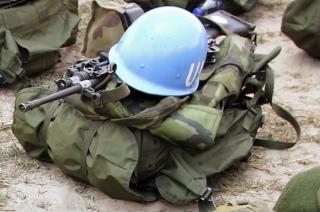The UN was created to maintain peace. How does it do that?
The UN has different means for dealing with conflict within or between member states, including: Conflict prevention Mediation Dispute resolution Peacekeeping and Peacebuilding. Peacekeeping is an essential tool for the UN. It is perhaps the most visible and, for those affected by conflict, the most tangible role that the UN plays. The Security Council is the UN body responsible for setting up peacekeeping operations.
- Since 1945 the UN has helped broker more than 170 peace settlements that have ended regional conflicts.[2]
- More UN peacekeepers are now deployed than ever before with over 117,000 personnel serving in 17 operations on four continents. This represents an eight-fold increase in peacekeepers since 1999.
Does the UN have a standing army?
The UN does not have a standing army of its own. Troops serving in UN peacekeeping operations are voluntarily contributed by the member states.
- As of June 2009, 118 countries had contributed military and police personnel to UN peacekeeping, with Pakistan, Bangladesh and India as the top three contributors.
Faced with the rising demand for increasingly complex peace operations, the UN has in the past few years been overstretched and challenged.
- The UK is in the top three of the top 20 contributors to the UN peacekeeping budget (with the USA in first and Japan in second place)
What are peacekeeping operations?
When a threat to peace is brought before the Security Council, it usually first asks the parties to reach agreement by peaceful means. If fighting breaks out or persists, the Security Council tries to secure a ceasefire. It may then send peacekeeping missions to troubled areas to restore peace. Peacekeeping operations encompass military, police and civilian personnel who are deployed to a conflict zone to monitor a ceasefire, help end a conflict and prevent it from re-emerging.
- Peacekeeping operations are established by the Security Council and directed by the Secretary-General of the UN, often through a special representative who will also act as Head of Mission.
- The Head of Mission has operational authority over the peacekeeping operation’s activities, including military, police and civilian resources. Troops are directed by military commanders.
- All operations are governed by three fundamental principles: consent of the warring parties, impartiality, and the non-use of force except in self-defence.
How has the UN’s peacekeeping role developed?
The first UN peacekeeping mission was established in 1948 when the Security Council authorised the deployment of military observers to the Middle East to monitor the Armistice Agreement between Israel and its Arab neighbours.
- Since then, The UN has sent 63 peacekeeping and observer missions to conflict areas over the past six decades.
But the nature of wars and conflict has also changed over the years. UN peacekeeping forces have, since the end of the Cold War, been increasingly deployed to internal conflicts and civil wars, often in situations where the consent of the warring parties could no longer be guaranteed. e.g. Congo?
Peacekeeping forces have also been asked to take on a new set of complex tasks including helping to administer war-torn countries, enforce peace settlements and, more recently, intervene to protect civilians at risk and build sustainable peace. This in turn has required a more dynamic taskforce and the need for women peacekeepers is more pressing than ever.
- The proportion of women deployed as civilians in peacekeeping operations has reached almost a third
- Although progress has been slower with the uniformed components of UN peacekeeping operations, seven per cent of the 13,000 policeofficers and two per cent of the 87,000 military personnel are women.
What happens when a country ignore the Security Council decisions?
When decisions of the Security Council are not complied with, the Council may take several actions to ensure their implementation. It can impose sanctions on trade and other economic activities, or take other specific measures such as arms embargoes and diplomatic restrictions. It can also authorise the use of force in certain instances. The Security Council can authorise a coalition of member states to use ‘all necessary means’ including military action, to deal with a conflict.
- In 1991 to restore the sovereignty of Kuwait after its invasion by Iraq, in 1992 to secure the environment for humanitarian relief to be delivered in Somalia, in 1994 to restore the democratically-elected government in Haiti and in 1999 to restore peace and security in East Timor
These measures are usually a last resort, to be used only if peaceful means of settling a dispute have been exhausted.

